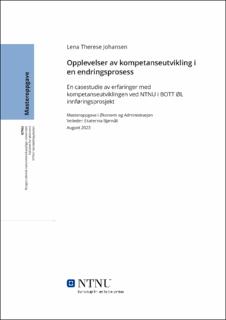| dc.contributor.advisor | Bjørnåli, Ekaterina | |
| dc.contributor.author | Johansen, Lena Therese | |
| dc.date.accessioned | 2024-04-02T17:20:04Z | |
| dc.date.available | 2024-04-02T17:20:04Z | |
| dc.date.issued | 2023 | |
| dc.identifier | no.ntnu:inspera:163935680:165076788 | |
| dc.identifier.uri | https://hdl.handle.net/11250/3124533 | |
| dc.description.abstract | Organisasjoner endrer seg kontinuerlig ved at nye digitale systemer og arbeidsmetoder tvinges frem i lys av dagens teknologi for å overleve, men også for å kunne utvikle seg i takt med samfunnet. Parallelt med organisasjonsendringer må gjerne ny kompetanse utvikles, og disse prosessene kan være svært utfordrende i praksis. Målet med denne studien er å bruke empiri og relevant teori for å besvare følgende problemstilling:
Hvilken rolle spiller gjennomføringen av kompetanseutviklingen og opplevelsen av læringsprosessene for Prosjektøkonomenes læringspotensial ved overgang til nytt økonomisystem ved NTNU?
For å besvare problemstillingen valgte jeg kvalitativ metode med casestudie som forskningsdesign. Ved å bruke NTNU som caseorganisasjon har jeg fått unikt innsyn i en pågående endringsprosess gjennom å forske på min egen arbeidsplass. Endringene omhandler blant annet implementering av et nytt digitalt økonomisystem forbindelse med BOTT ØL innføringsprosjekt. Jeg har brukt ulike datainnsamlingsmetoder i denne oppgaven, og empirien er samlet gjennom fem dybdeintervju, observasjonsstudier og dokumentstudier. Funn fra datainnsamlingen er blitt drøftet i lys av teori om kompetanseutvikling og læring for å besvare problemstillingen fra to ulike analysenivå.
Mine funn viser at tilrettelegging for læringspotensial har flere utfordringer. Det er både utfordrende på bakgrunn av organisasjonsspesifikke omstendigheter som økonomi og struktur, men også fordi ansattes opplevelser av læringsprosessene er avgjørende for læringspotensial. Ansattes opplevelse av læringsprosessene, tilgjengelig tid og brukerstøtte spiller en viktig rolle for mestringsfølelsen og motivasjon. Ledelsen kan gjennom formidling styre forventninger for å motvirke negative opplevelser, og dermed spille en viktig rolle for å kunne forme de ansattes forventinger og læringspotensial. Studiet mitt viser hvordan forståelsen av kompetanseutvikling og læringsprosesser i organisasjoner kan påvirke resultatet av læringspotensialet i organisasjonen. | |
| dc.description.abstract | Organizations are constantly changing. New digital systems and working methods are forced forward in the light of today's technology, both in order to survive, but also to be able to develop intact with society. Along with organizational change, new competence must often be developed. These processes can be very challenging in real life. The meaning of this study is to use empirical evidence and relevant theory to answer this following question:
How can the implementation of competence development and learning processes affect the project economists' learning potential when transitioning to a new financial system at NTNU?
To answer this question, I chose a qualitative method with a case study as research design. By studying the organization NTNU in this case study, I had the opportunity to develop a unique insight into an ongoing change process. I did this by researching my own workplace. The changes in NTNU involves, among other things, an implementation of a new digital financial system. The system is introduced through the BOTT ØL introduction project.
I have used various of data collection methods in this thesis. The empirical evidence has been gathered through five in-depth interviews of both managers and employees, observational studies, and document studies. Findings from the data collection have been discussed in the light of theory about competence development and learning processes to answer the problem from two different levels of analysis.
My findings show that facilitating learning potential has several challenges. It is challenging based on organization-specific circumstances such as finances and structure. But also, because employees' experiences of the learning process are an important factor for the learning potential. Employees' available time and experience of user support plays and the learning process itself plays an important role in their sense of mastery faith and motivation. Through leadership, creating expectations can counteract with employee’s perception and motivation, and thus being able to shape the employees’ expectations and learning potential. My study shows how the understanding of competence development and learning processes in organizations can influence the outcome of the learning potential in the organization. | |
| dc.language | nob | |
| dc.publisher | NTNU | |
| dc.title | Opplevelser av kompetanseutvikling i en endringsprosess | |
| dc.type | Master thesis | |
